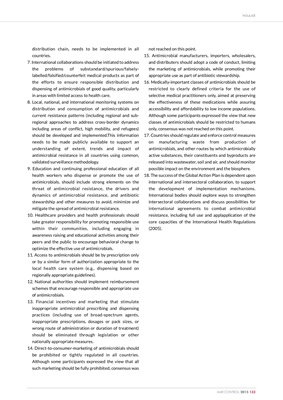
distribution chain, needs to be implemented in all
countries.
7. International collaborations should be initiated to address
the problems of substandard/spurious/falselylabelled/falsified/counterfeit
medical products as part of
the efforts to ensure responsible distribution and
dispensing of antimicrobials of good quality, particularly
in areas with limited access to health care.
8. Local, national, and international monitoring systems on
distribution and consumption of antimicrobials and
current resistance patterns (including regional and subregional
approaches to address cross-border dynamics
including areas of conflict, high mobility, and refugees)
should be developed and implemented.this information
needs to be made publicly available to support an
understanding of extent, trends and impact of
antimicrobial resistance in all countries using common,
validated surveillance methodology.
9. Education and continuing professional education of all
health workers who dispense or promote the use of
antimicrobials, should include strong elements on the
threat of antimicrobial resistance, the drivers and
dynamics of antimicrobial resistance, and antibiotic
stewardship and other measures to avoid, minimize and
mitigate the spread of antimicrobial resistance.
10. Healthcare providers and health professionals should
take greater responsibility for promoting responsible use
within their communities, including engaging in
awareness raising and educational activities among their
peers and the public to encourage behavioral change to
optimize the effective use of antimicrobials.
11. Access to antimicrobials should be by prescription only
or by a similar form of authorization appropriate to the
local health care system (e.g., dispensing based on
regionally appropriate guidelines).
12. National authorities should implement reimbursement
schemes that encourage responsible and appropriate use
of antimicrobials.
13. Financial incentives and marketing that stimulate
inappropriate antimicrobial prescribing and dispensing
practices (including use of broad-spectrum agents,
inappropriate prescriptions, dosages or pack sizes, or
wrong route of administration or duration of treatment)
should be eliminated through legislation or other
nationally appropriate measures.
14. Direct-to-consumer-marketing of antimicrobials should
be prohibited or tightly regulated in all countries.
Although some participants expressed the view that all
such marketing should be fully prohibited, consensus was
not reached on this point.
15. Antimicrobial manufacturers, importers, wholesalers,
and distributers should adopt a code of conduct, limiting
the marketing of antimicrobials, while promoting their
appropriate use as part of antibiotic stewardship.
16. Medically-important classes of antimicrobials should be
restricted to clearly defined criteria for the use of
selective medical practitioners only, aimed at preserving
the effectiveness of these medications while assuring
accessibility and affordability to low income populations.
Although some participants expressed the view that new
classes of antimicrobials should be restricted to humans
only, consensus was not reached on this point.
17. Countries should regulate and enforce control measures
on manufacturing waste from production of
antimicrobials, and other routes by which antimicrobially
active substances, their constituents and byproducts are
released into wastewater, soil and air, and should monitor
possible impact on the environment and the biosphere.
18. The success of the Global Action Plan is dependent upon
international and intersectoral collaboration, to support
the development of implementation mechanisms.
International bodies should explore ways to strengthen
intersectoral collaborations and discuss possibilities for
international agreements to combat antimicrobial
resistance, including full use and applapplication of the
core capacities of the International Health Regulations
(2005).
WAAAR
AMR CONTROL 2015 133